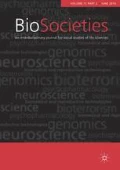Abstract
Evidence-based medicine emerged in connection with struggles for clinical authority in the second half of the twentieth century, as patient-centred medicine and community-oriented medicine presented challenges to laboratory-oriented medicine. The renowned medical researchers Alvan Feinstein and Archie Cochrane helped to develop the new models of patient-centred and community-oriented medicine respectively. They made important contributions to methodological reflections in medicine, and also contributed to social theories about clinical medicine and health care, challenging and criticizing in different ways dominant ontological medical understandings (such as essentialist conceptions of disease and illness). The medical ontologies of patient-centred and community-oriented medicine comprise different (partly incompatible) perspectives on what constitutes standards of evidence, something reflected, for example, in Feinstein and Cochrane's contrary views on the importance of controlled trials. The analysis of their work in this article illuminates the connection between medical ontologies, standards of evidence and the political in general, reminding us of the need to explore the role of politics in discussions of evidence-based medicine.
Similar content being viewed by others
Notes
1 I will use the terms ‘patient-centred medicine’ and ‘clinical epidemiology’ interchangeably throughout.
2 The philosophy faculty referred to by Kant comprised what we today call basic sciences.
3 I have developed this interpretation elsewhere (Jensen, 2004).
4 For a detailed discussion of and critique of medical essentialism and the ideal of specific treatment see Jensen (1987).
References
Austin J.L. (1962). Sense and sensibilia. Oxford: Oxford University Press.
Brandt A.M., & Gardner M. (2000). The golden age of medicine? In Cooter R. & Pickstone J. (Eds), Companion to medicine in the twentieth century, 21–37. London: Routledge.
Cochrane A. (1972). Effectiveness and efficiency: Random reflections on health services. London: Nuffield Provincial Hospitals Trust.
Daly J. (2005). Evidence-based medicine and the search for a science of clinical care. Berkeley: University of California Press.
Dubos R. (1965). Man adapting. New Haven, CT: Yale University Press.
Feinstein A.R. (1967). Clinical judgement. New York: Robert E. Krieger Publishing Co.
Feinstein A.R. (1994). Clinical judgement revisited: The distraction of quantitative models. Annals of Internal Medicine, 120, 799–805.
Feinstein A., & Horwitz R.I. (1997). Problems in the ‘evidence’ of ‘evidence-based medicine’. American Journal of Medicine, 103, 529–535.
Flexner A. (1910). Medical education in the United States and Canada: A report to the Carnegie Foundation for the Advancement of Teaching. New York: Carnegie Foundation for the Advancement of Teaching.
Goodman K.W. (2003). Ethics and evidence-based medicine: Fallibility and responsibility in clinical science. Cambridge: Cambridge University Press.
Hacking I. (1975). The emergence of probability. Cambridge: Cambridge University Press.
Horton R. (2003). Health wars: On the global front lines of modern medicine. New York: New York Review of Books.
Jensen U.J. (1987). Practice and progress: A theory for the modern health care system. Oxford: Blackwell Scientific.
Jensen U.J. (2004). Evidence, effectiveness and ethics: Cochrane's legacy. In Kristiansen I.S. & Mooney G. (Eds), Evidence-based medicine: In its place, 20–32. London: Routledge.
Kant I. (1979/1798). The conflict of the faculties. Lincoln: University of Nebraska Press.
Kristiansen I., & Mooney G. (2004). Evidence-based medicine: In its place. London: Routledge.
Le Fanu J. (1999). The rise and fall of modern medicine. London: Little, Brown.
McKeown T. (1976). The rise of medicine—Dream, mirage or nemesis. London: Nuffield Provincial Hospitals Trust.
McCormick R.L. (1981). The discovery that business corrupts politics: A reappraisal of the origins of progressivism. American Historical Review, 86, 247–274.
Marks H.M. (1997). The progress of experiment: Science and therapeutic reform in the United States, 1900–1990. Cambridge: Cambridge University Press.
Mol A. (2002). The body multiple: Ontology in medical practice. Durham, NC: Duke University Press.
Mouffe C. (2005). On the political. London: Routledge.
Oakley A. (2000). Experiments in knowing: Gender and method in the social sciences. New York: New Press.
Oxford Advanced Learner's Dictionary (1993). Fourth edn; eighth impression (with corrections). Oxford: Oxford University Press.
Ramsey P.G., Garline J.D., Inue T.S., Larsen E., Logerfo J., Norun J. et al. (1991). Changes over time in the knowledge base of practicing internists. Journal of the American Medical Association, 266, 1103–1107.
Reynolds S. (2000). The anatomy of evidence-based practice. In Trinder L. with Reynolds S. (Eds), Evidence-based practice: A critical appraisal, 17–34. Oxford: Blackwell Science.
Rose N. (1999). Powers of freedom: Reframing political thought. Cambridge: Cambridge University Press.
Rosenberg C. (1979). The therapeutic revolution: Medicine, meaning and social change in nineteenth-century America In Vogel M.J. & Rosenberg C. (Eds), The therapeutic evolution: Essays in the social history of American medicine, 3–25. Philadelphia, PA: University of Pennsylvania Press.
Sackett D.L., Rosenberg W., Gray J.A.M., Haynes R.B., & Richardson W.S. (1996). Evidence-based medicine: What it is and what it isn't. British Medical Journal, 312, 71–72.
Schmitt C. (1976). The concept of the political. New Brunswick, NJ: Rutgers University Press.
Simmons G.H. (1907). The commercial domination of therapeutics and the movement for reform. Journal of the American Medical Association, 48, 1645.
Taylor C. (1985). Social theory as practice. In Taylor C. (Ed.), Philosophy and the human sciences, 91–115. Cambridge: Cambridge University Press.
Thomas L. (1984). The youngest science. Oxford: Oxford University Press.
Timmermans S., & Berg M. (2003). The gold standard: The challenge of evidence-based medicine and standardization in health care. Philadelphia, PA: Temple University Press.
Trinder L. (2000). Introduction: The context of evidence-based practice. In Trinder L. with Reynolds S. (Eds), Evidence-based practice: A critical appraisal, 1. Oxford: Blackwell Science.
Virchow R. (1975/1869). Über die Heutige Stellung der Pathologie. In Rothschuh K.E. (Ed.), Was ist Krankheit?, 72–91. Darmstadt: Wissenschaftliche Buchgesellschaft.
Wittgenstein W. (1969). On certainty. Oxford: Basil Blackwell.
Acknowledgements
I am grateful to the editors and this journal's anonymous reviewers for very helpful comments and criticisms.
Author information
Authors and Affiliations
Rights and permissions
About this article
Cite this article
Jensen, U. The Struggle for Clinical Authority: Shifting Ontologies and the Politics of Evidence. BioSocieties 2, 101–114 (2007). https://doi.org/10.1017/S174585520700508X
Published:
Issue Date:
DOI: https://doi.org/10.1017/S174585520700508X




